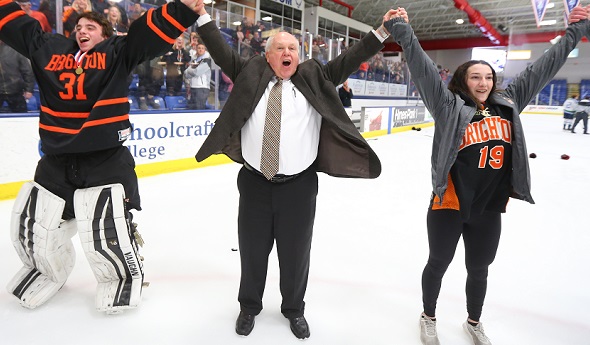
Brighton Coach's Impact 'Immeasurable'
By
Tim Robinson
Special for MHSAA.com
October 7, 2020
By Tim Robinson
Special for Second Half
Paul Moggach has never been much for looking back.
 And as he begins his first season away from the Brighton hockey program in more than three decades, he’s still looking ahead.
And as he begins his first season away from the Brighton hockey program in more than three decades, he’s still looking ahead.
“I’m thinking about what I’m going to miss more than the mark I left,” he said in a phone conversation last week. “I guess I enjoyed so much of the time I had, the opportunity to coach at Brighton, I’m thinking more how I fill the time and the things I'll miss.”
Moggach (pronounced MUG-uth) retired as Brighton’s coach this past summer after 25 seasons and having led five teams to MHSAA Division 1 championships. He compiled a record of 466-172-47 during that period.
But that’s not what he remembers most, nor why he wants people to remember him.
“I would like them to remember the teams and players who played for me and my assistants, more than me,” Moggach said. “We have so many blessings and opportunities in our lives, and hockey was one for me and hopefully for the players and assistants I worked with.”
One of those assistants was Kurt Kivisto, who joined the Bulldogs originally as a team manager more than 20 years ago and was a player at Brighton. He eventually won a national championship at Michigan State before rejoining the program as an assistant coach a decade ago.
“The No. 1 thing I’ll take from him is sticking by your beliefs and not sacrificing those beliefs for the team,” said Kivisto, who was named Moggach’s successor in September. “He sticks by those beliefs and ... he’s not willing to sacrifice that even if it could hurt the team. The character and integrity he has, how he treats people with fairness and what he believes is right is the biggest thing I’ll take.”
A stepson, Damon Whitten, played for Moggach at Brighton and at MSU before becoming an assistant coach and eventually the head coach at Lake Superior State, where he is in his eighth season.
Asked about Moggach’s impact at Brighton, Whitten said, “I’m not sure you can measure it. Your mind goes to the hockey players who have come to Brighton, and that’s a big part. But I think it goes beyond that. The money they’ve raised over the years for different families in need, for example. He’s had a big impact, and the players he had were a big part of that, but it goes well beyond that, and he did it the right way. Thirty-plus years (in the program), and I’m not sure you can count more than a handful of times where he made a bad decision or handled things poorly. He did things the right way, every day, all of the time, and I think it’s why he was so successful for so long.”
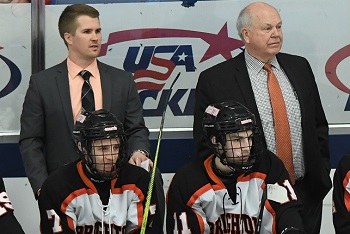 The team’s charitable works were mostly kept under the radar – Moggach’s reasoning being his players had been given much, it was their turn to give back, and he didn’t want people thinking they did those things for publicity.
The team’s charitable works were mostly kept under the radar – Moggach’s reasoning being his players had been given much, it was their turn to give back, and he didn’t want people thinking they did those things for publicity.
Moggach joined Rick Bourbonais as an assistant at Brighton in the mid-1980s, then switched roles with him for the 1996-97 season.
He realized Brighton’s potential in the 1992-93 season, when the Bulldogs upset perennial state power Trenton in the Class A Quarterfinals before losing to Detroit Catholic Central in a Semifinal.
“That, to me, said, at least in my mind, that we can do this,” Moggach said. “It’s not impossible.”
He slowly began to build the program, getting good players and a schedule that would challenge them.
“You get the players by building a good culture,” he said. “Back in the day, when I started, we weren’t very disciplined and our league wasn’t very disciplined. So I think we realized we had to build that, and I could have an influence on building that in Brighton.”
Along with the culture, Moggach looked for an edge whenever he could find it. He was talked into making a trip to the Keweenaw Peninsula by one of his player’s parents, and found enormous benefits for his team, both competitively and in team bonding.
“It’s a lot about the little things we do,” he said, “that we find joy in, and create those opportunities. Creating the little moments really can build to bigger moments. We played capture the flag one day in about two feet of snow.
“Almost killed them,” he added, chuckling. The exhausted players didn’t have much left for the game that night, but spending time together for four days in a bus and hotel room always brought the team closer on and off the ice.
That first UP expedition also led to more teams making the trip, for team bonding and a glimpse of a part of the state, and themselves, they might never have seen otherwise.
“We didn’t do that for long,” he said. “But we always came back saying we were better together because of that experience.”
Bob Nelson had three sons play for Moggach, and Nelson’s wife, Kris, was president of the team’s booster club during their involvement over nearly a decade in Brighton hockey. Nelson also coached the program’s younger players for five seasons.
“We got to know the Moggachs really well,” he said. “It was a good experience, both as a coach and as a parent as well.”
Moggach introduced other things, including an emphasis on nutrition and off-ice training, that players resisted at first until they saw the benefits.
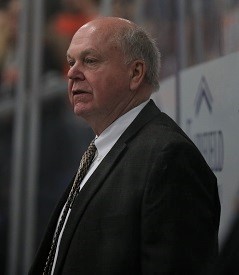 He savored conversations with referees and opposing coaches before the games and even the occasional reporter after games.
He savored conversations with referees and opposing coaches before the games and even the occasional reporter after games.
But his first priority was the players. At times he would erupt in practice at a player or, more commonly, the team, and the boys soon learned to hear the message, not the volume. But for a couple of seasons, they also wrote some of his wilder statements down in a notebook after practice.
One year, they read some of them at the banquet, and after each one, Moggach’s wife, Sharon, would look at him and ask, “Did you really say that?”
Moggach would laugh and confess to remembering he had actually done so, then laughing.
“He knew part of what made the program good was his relationship to the players,” Nelson said. “If it was a good time, he wanted to enjoy it, even at his own expense at times.”
Moggach has staying in the background this offseason, letting Kivisto shape the team.
Asked if he were willing to fully switch coaching roles, as he and Bourbonais did a quarter-century ago, Moggach laughed.
“No,” he said emphatically. “Rick wasn’t in his 70s when we made the switch. Kurt needs his time. I’ll be there if he needs me.”
Moggach, who is 74, still works fulltime as the University of Michigan’s director of risk management.
He plans to spend more time with his wife and watch his grandsons play hockey, as well as catching some Lake Superior State games.
“I was really blessed to have Rick and Brownie (longtime assistant Mike Brown) along for the ride, and then to get Kurt involved,” Moggach said. “They weren’t the only ones, but they were the kids for me.
“The other thing is the support from the Brighton (High School) administration, the teachers, and our community. There are more people to thank than I could ever bring up. I do think that, all together, it was a great run. It couldn’t have been any better.”
PHOTOS: (Top) Recently-retired Brighton hockey coach Paul Moggach celebrates the 2018 Division 1 championship game win over Saginaw Heritage at USA Hockey Arena. (Middle) Former player Kurt Kivisto, left of Moggach during the 2018 Semifinal win over Detroit Catholic Central, served as an assistant before assuming the head coaching job in September. (Below) Brighton's 2018 championship was its fifth under Moggach. (Photos by Hockey Weekly Action Photos.)
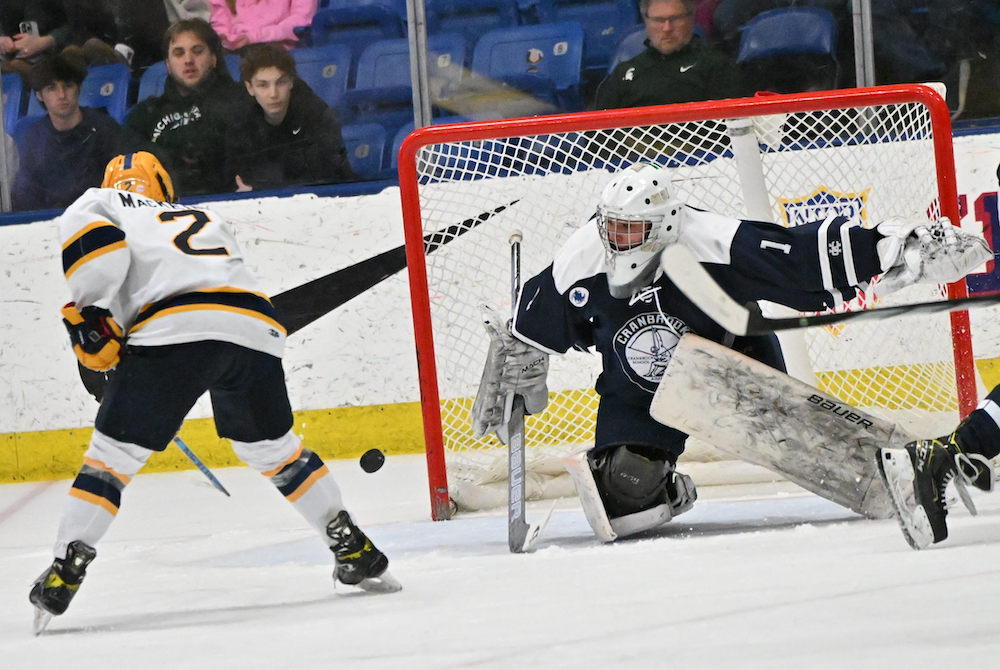
Unexpected Scorer Ices Unranked Cranes' Record 19th Title Win with OT Goal
March 9, 2024
PLYMOUTH — On one of Bloomfield Hills Cranbrook Kingswood’s least likely championship hockey teams, one of the least likely players was the hero.
Junior defenseman David Schmitt’s fourth goal of the season 3:34 into the third overtime gave the Cranes their 19th MHSAA Finals championship with a 3-2 victory over East Grand Rapids in the Division 3 title game Saturday at USA Hockey Arena.
Schmitt scored from the right point off a faceoff win. It was his second goal of the game and third in two games over the weekend.
“I just went blank,” he said. “Did I do that? It was pretty crazy.”
Prior to the MHSAA Semifinals, Schmitt had only one goal and four assists in 28 games.
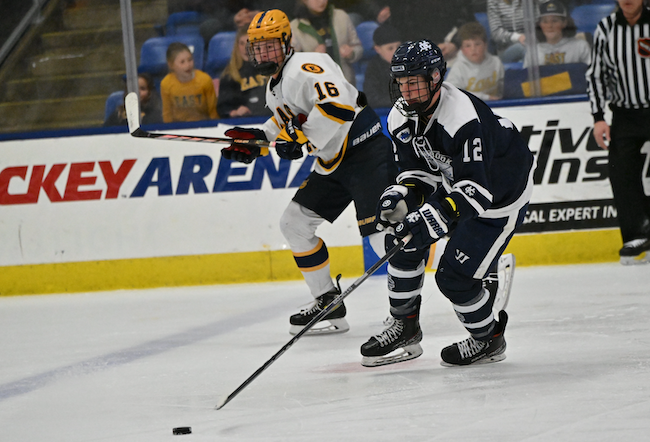 “Coaches were telling me to get pucks off quick on net and see what’ll happen,” Schmitt said. “I did. I saw a lane, shot it and it went in.
“Coaches were telling me to get pucks off quick on net and see what’ll happen,” Schmitt said. “I did. I saw a lane, shot it and it went in.
“It’s incredible, but it’s not just me. It’s the team, everybody, the coach, our goalie. Everybody put in equally as much work. I can’t say enough about these guys. It’s an incredible team.”
Cranbrook-Kingswood came into the MHSAA playoffs unranked and completely under the radar, which was understandable given its 11-13-1 regular-season record. And it had been three years since the Cranes’ last Finals championship, their record 18th.
Players and coaches believe the team finally began to gel about a month ago.
“I think it starts at the top with leadership on the team,” Cranes senior Michael Horton said. “I remember coach (John) LaFontaine saying at the beginning of the year and throughout the year (that we’ll struggle) if the leadership on this team cannot come together, because the younger guys will see that and they’ll just be like, ‘Oh, our seniors, our leaders, our whatevers, they don’t trust each other, so how are we supposed to trust them? How are we supposed to trust this process?’ Before every overtime, before every play, we’d go up to each other and say, ‘I trust you. I trust you with everything I have.’”
The championship doesn’t happen without the stellar goaltending of junior Garrett Dudlar, who joined the team around Christmas and made 53 saves Saturday, the second-most in an MHSAA Final. The record of 58 was set by Orchard Lake St. Mary’s Ryan Morley-Stockton in an eight-overtime 1-1 tie with Marquette in the 2008 Division 1 title game.
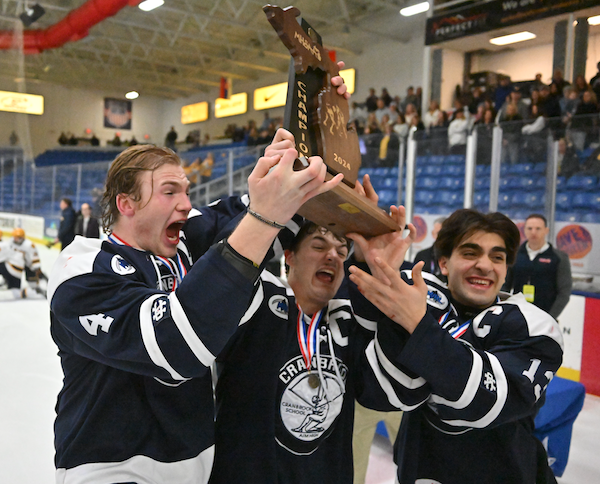 Dudlar stopped the final 39 shots he faced.
Dudlar stopped the final 39 shots he faced.
“It was definitely different,” Dudlar said of playing triple overtime. “We played a solid game so far, so nothing changed; keep it the same.”
East Grand Rapids senior Glenn Green opened the game by scoring the fastest goal to start a Final, just 12 seconds after the opening faceoff. The previous record of 18 seconds was set by East Kentwood’s Jason Bravata against Trenton in the 1990 Class A Final.
Kyle Braunscheidel responded for the Cranes by the 4:14 mark. The Pioneers took a 2-1 lead into the intermission after James Albers scored on the power play at 15:39 of the first.
Schmitt scored the only goal of the second period just three seconds into a two-man advantage at 8:28.
For the Pioneers, it was the second year in a row they lost in gut-wrenching fashion in the championship game. Last season, they lost 3-2 to Flint Powers Catholic when Mason Czarnecki scored on a breakaway with 4.6 seconds left for the latest winning goal in regulation time in Finals history.
“There’s, what, 142 teams in the state,” East Grand Rapids coach Christopher Newton said. “Not many people are trying to win, trying to get through a season and set high goals. We had that group. It doesn’t come around very much, so it’s really disappointing.”
PHOTOS (Top) Cranbrook goalie Garrett Dudlar (1) gets in position to stop a shot from East Grand Rapids’ Ian MacKeigan. (Middle) The Cranes’ Nick Timko (12) brings the puck up the ice with EGR’s Charlie Hoekstra in pursuit. (Below) Cranbrook captains Thomas Kiemel (4), Roman Cicco and Michael Horton (13) celebrate the title. (Photos by Hockey Weekly Action Photos.)

